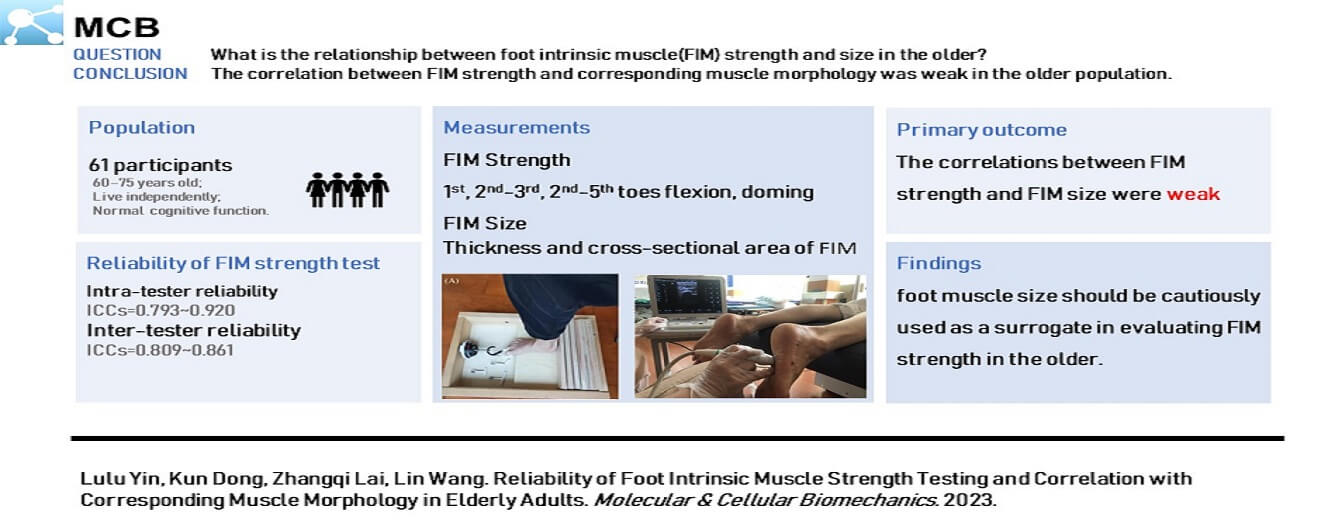 Open Access
Open Access
ARTICLE
Reliability of Foot Intrinsic Muscle Strength Testing and Correlation with Corresponding Muscle Morphology in Elderly Adults
1 Key Laboratory of Exercise and Health Sciences, Shanghai University of Sport, Shanghai, 200438, China
2 The Third School of Clinical Medicine (School of Rehabilitation Medicine), Zhejiang Chinese Medical University, Hangzhou, 310053, China
* Corresponding Author: Lin Wang. Email:
# These authors contributed equally to this work
Molecular & Cellular Biomechanics 2023, 20(1), 23-33. https://doi.org/10.32604/mcb.2023.040788
Received 30 March 2023; Accepted 29 May 2023; Issue published 20 June 2023
Abstract
Age-related loss of foot intrinsic muscle (FIM) strength may be associated with disability, falls, and inability to perform daily activities. Previous studies have determined the reliability of FIM strength testing and evaluated the relationship between FIM strength and corresponding muscle morphology in young adults. However, few studies have measured FIM strength in the older. Therefore, this study aimed to assess the intra- and inter-reliability of FIM strength tests and the relationship between FIM strength and FIM size in the older. A total of 61 participants aged 60–75 years were recruited, and 18 of them were selected randomly for the verification of FIM strength test reliability. A portable dynamometer was used in evaluating FIM strength, particularly the 1st (FT1), 2nd–3rd (FT2-3), and 2nd–5th (FT2-5) toes flexion, and doming. A portable musculoskeletal ultrasound device was used in measuring the cross-sectional area (CSA) and thickness of FIMs, namely, flexor digitorum brevis (FDB), abductor hallucis (AbH), flexor hallucis brevis, quadratus plantae (QP), and abductor digiti minimi (AbDM). Intra- and interclass correlation coefficients (ICCs) were used in evaluating the reliability of the FIM strength tests, and Pearson’s correlation coefficients were used in determining the relationship between FIM strength and FIM size. All FIM strength tests showed good to excellent intratester reliability (ICCs: 0.793–0.920). Doming, FT2-3, and FT2-5 tests exhibited good intertester reliability (ICCs: 0.809–0.861). Doming strength was only correlated positively significantly with the thickness of AbH (r = 0.257, p = 0.046), FT1 strength was correlated negatively with AbDM thickness (r = −0.375, p = 0.003), FT2-3 strength was significantly positively correlated with the CSA of FDB (r = 0.359, p = 0.004) and the thickness (r = 0.273, p = 0.033) and CSA (r = 0.287, p = 0.025) of QP. FT2-5 strength was positively correlated with the CSA of FDB (r = 0.297, p = 0.020) and the thickness (r = 0.258, p = 0.045) and CSA (r = 0.319, p = 0.012) of QP but negatively correlated with the thickness of AbDM (r = −0.296, p = 0.020). The correlation between FIM strength and FIM size was weak. The findings suggested that foot muscle size should be cautiously used as a surrogate in evaluating FIM strength in the older.Graphic Abstract

Keywords
Cite This Article
 Copyright © 2023 The Author(s). Published by Tech Science Press.
Copyright © 2023 The Author(s). Published by Tech Science Press.This work is licensed under a Creative Commons Attribution 4.0 International License , which permits unrestricted use, distribution, and reproduction in any medium, provided the original work is properly cited.


 View Full Text
View Full Text Download PDF
Download PDF Downloads
Downloads
 Citation Tools
Citation Tools